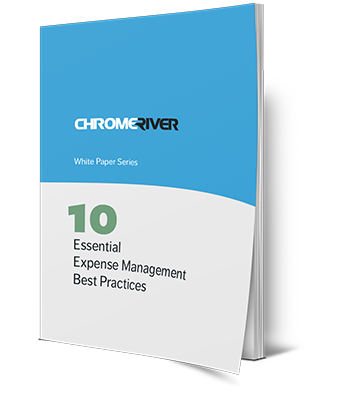
I had the opportunity to deliver a best-practices webinar with Information Builders, a leading provider of Internet-based business intelligence and reporting solutions. They also provide the technology behind Chrome River ANALYTICS, the management reporting module within the Chrome River expense management softwaresuite.
My idea for the webinar topic came from a white paper written by Anne Becknell, our SVP of Implementation Services regarding the "10 Expense Management Best Practices." Anne describes a concept called "Leverage Your Leverage," which essentially means that you can leverage your expense report software for even greater gain than you initially anticipated.
Many people look at expense report automation as merely a tactical process-improvement opportunity. Even so, just by moving away from a manual expense process, companies can realize the significant benefits of:
• A more efficient process requiring less time and effort
• Cost savings through automated enforcement of company expense policies
• Cost avoidance via expense pre-approvals
• Reduced audit and administrative overhead
• Improved spend visibility
It is the improved spend visibility that provides the opportunity for us to "leverage our leverage." Because expense management software is a transactional system, we have an exceptional opportunity to capture the right data and then report on that data in a variety of different ways that positively impact our business. The Chrome River ANALYTICS tool set includes dashboards, highly configurable and dynamic standard reports, and an ad-hoc report writer—all at the analyst’s fingertips. This allows for some very powerful and impactful leverage to be created, including:
• Reducing costs and increasing profitability
• Monitoring financial and operational KPIs
• Reducing time and effort during financial close
• Maintaining regulatory compliance
During the webinar we discussed how, in order to obtain these significant benefits, it's important to set yourself up for success by first contemplating the data that is captured as part of your expense management software process. For example, rather than lumping data elements together in a broad "Description" field, it's much better to have unique fields available for important information that you would like to report on later. Maybe you are trying to examine the number of flights by airfare class and the ticketing agents used to book the flights as part of a travel-management analysis. Culling this information from a broad description field would add many hours of effort to the analysis.
In conclusion, when you are attempting to leverage your expense management software, you should:
1. Understand that process means control, but knowledge is power
2. Consider which data is required for analysis later
3. Utilize world-class analytics tools like those from Information Builders
4. Go ahead—Leverage Your Leverage!
For more information on leveraging your expense management software, go towww.chromeriver.com. We hope you'll consider requesting a demonstration.
Search
Subscribe
Latest Posts
- Driving AP Success With Automation Part 3: How to Save Time and Money While Increasing Compliance
- Driving AP Success With Automation Part 2: How to Create More Efficient Processes With AP Automation
- VAT IT Partners With Emburse to Help Companies Save 27% on Expenses
- Driving Success With Automation Part 1: 4 Common AP Management Bottlenecks
- The Future of Finance: 5 Predictions For Digital Transformation in 2022 And Beyond
Posts by Category
Our choice of Chrome River EXPENSE was made in part due to the very user-friendly interface, easy configurability, and the clear commitment to impactful customer service – all aspects in which Chrome River was the clear winner. While Chrome River is not as large as some of the other vendors we considered, we found that to be a benefit and our due diligence showed that it could support us as well as any large players in the space, along with a personalized level of customer care.
We are excited to be able to enforce much more stringent compliance to our expense guidelines and significantly enhance our expense reporting and analytics. By automating these processes, we will be able to free up AP time formerly spent on manual administrative tasks, and enhance the role by being much more strategic.